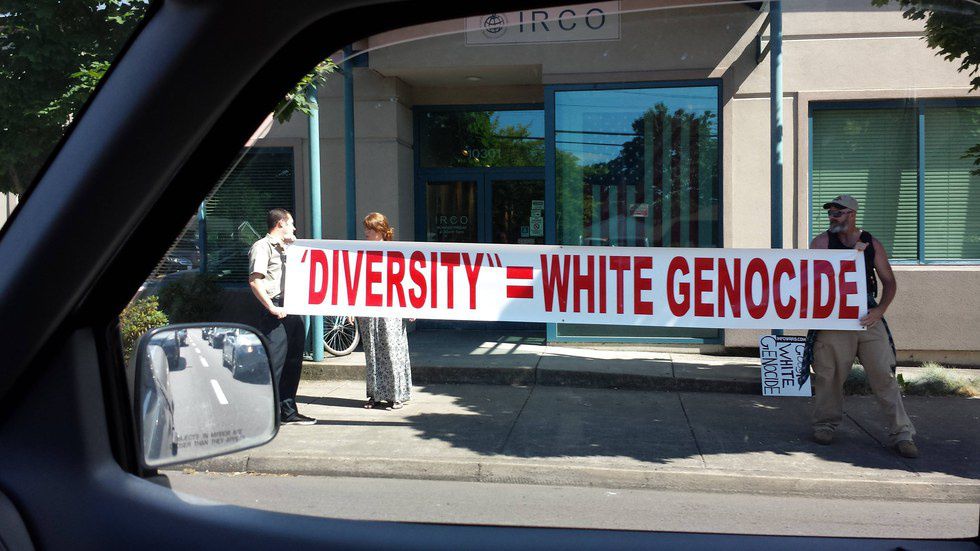Last Monday proved to be a evening of unnecessary abuse for Leslie Jones, a comedian and co-star of the recently released movie, "Ghostbusters." The production has come under attack after it was first revealed that the reboot of the original film would feature an all-female cast. Jones in particular has become the brunt of mockery, becoming the target of racist and sexist remarks by hundreds of internet trolls since its weekend premiere.
The white-casted stars have endured much gender-based criticism and outrage, but it was different for Jones, who said the experience was like being in her own "personal hell" after anonymous Twitter accounts sent her a stream of pornography, racist speech and especially hateful memes. Her frustration appeared to come to head as the comedian began battling the internet bullies. However, the exchange only lasted for a few hours before Jones stated her departure from the social platform.
"I leave Twitter tonight with tears and a very sad heart," Jones wrote. "All this 'cause I did a movie."
This is not the first time there has been an uproar over black stars in cinema. If you remember back in 2014, it was announced that Oscar-nominated Quvenzhane Wallis was to star in the remake version of the musical, "Annie." Reactions were mixed, with opposers exclaiming reverse racism scenarios like "What if a white person played 'Fresh Prince of Bel Air' or 'The Bill Cosby Show?'" (I find it interesting how no-one could bring up an equivalent black-starred movie. If that doesn't prove a lack of representation, then I don't know what does) and argued that "black culture" was being forced in their faces (Kind of how like how whitewashed media has been shoved in our faces for decades?). Identical circumstances happened when it was announced that Hermione Granger in the play, "Harry Potter and the Cursed Child", would be played by a black actress, when there was a widespread "revelation" that Rue from "The Hunger Games" was black, and when African-British actor John Boyega's leading role in "Star Wars: The Force Awakens" influenced huge racial backlash, most of them bigoted in nature.
#BoycottStarWarsVII because it will be ghetto garbage. pic.twitter.com/SkNiqg8bKX
— Lord Humungus (@DarklyEnlighten) October 19, 2015
#BoycottStarWarsVII because we want a protagonist who speaks English properly and doesn't promote #WhiteGenocide
— Anime Dating Advice (@AnimeDating) December 18, 2015
In 2015, "#BoycottStarWarsVII" became a huge trending hashtag on social media, primarily on Twitter, after the greatly anticipated trailer shown Boyega as a Storm Trooper. Almost immediately, the majority of online users took to their accounts, accusing the film of promoting "white genocide," arguing that the film was propaganda made to demoralize and destroy whites.
Advocates for "#WhiteGeNOcide" and identical ideas don't seem to realize that this conspiracy theory is a myth. They often fail to understand socio-economic factors and make plenty of false assumptions from their irrational fear.
In the light of exposing the belief, Emil Karlsson for Debunking Denialism thoroughly covers subjects like demographic change and anti-racism, and even responds to a number of opposers. In one comment, a user had deemed "racists" as a hate word, to which Karlsson responded:
"The term “racist” is sometimes used indiscriminately, but it is not a hate word. That is another example of racists playing the martyr card...anti-racist is not a code word for anti-white as people of different cultures, political and philosophical beliefs and anti-racism is not just against white supremacy, but also against the Indian caste system and so on."
Concepts like these is what fuels white supremacy. Whites wouldn't fret on becoming "minor" if they didn't already believe they were "superior," and they sure as hell wouldn't fret on their "loss" if they didn't already believe in their "privilege." And it's quite narcissistic, really, to believe that those who want more representation--and those who are willing to give it--are plotting against white lives.
Maybe if these people made is less about "them," they would understand that it's more about "us."
Representation is important, especially in minority lives. Star Trek's Lieutenant Uhura was one of the first Black female characters on television not portrayed as a "mammy," but as a communications officer. Whoopi Goldberg shared her excitement on Nichelle Nichols's presence in the following quote found on the Star Trek's website:
"When I was nine years old, Star Trek came on. I looked at it and went screaming through the house, 'Come here, Mum, everybody, come quick, come quick, there's a black lady on TV, and she ain't no maid!' I knew right then and there I could be anything I wanted to be."
In just a few sentences, Goldberg just explained what all blacks are thinking when they see their likeness in media as fully realized characters and human beings. Representation is not just important in terms of self-worth, but because it normalizes our humanity to others. Their experiences are not completely "ethnical;" blacks can experience universal feelings and happenings, too Viola Davis, a big supper of #OscarSoWhite, said it best in an interview with Motto, stating that "people of color are part of the human experience, too."
After Leslie Jones opened up to Seth Meyers about the abuse she's faced on Twitter, the comedian went back on the social media platform to share her new tactic for engaging with haters: spread love. Instead of retweeting negative messages, she advises her followers to "hug someone," and "Go out and be nice to someone."
As for representation, let's work to make our voices heard. If society demonstrates what they would like to see in media, the ones in power are likely to make the opportunity possible. The lead doesn't always have to be a white male or female, and it's up to us to create that change.





















